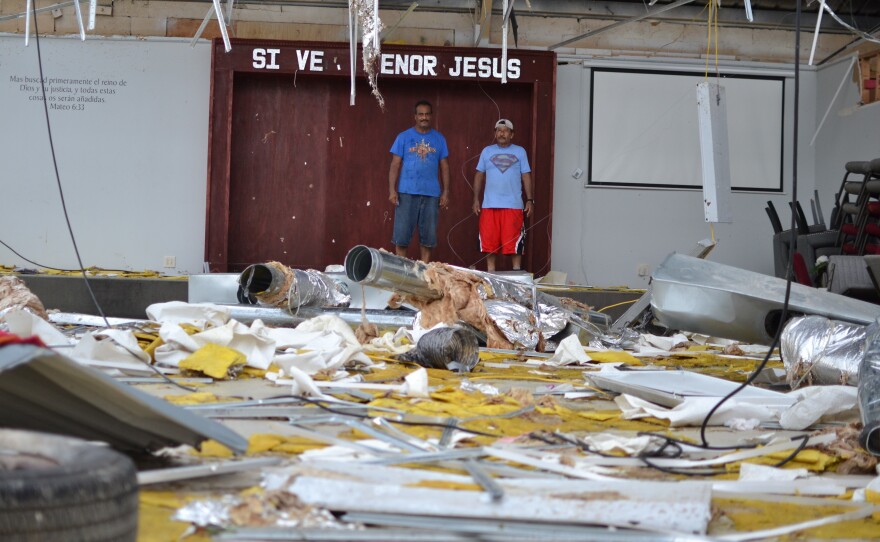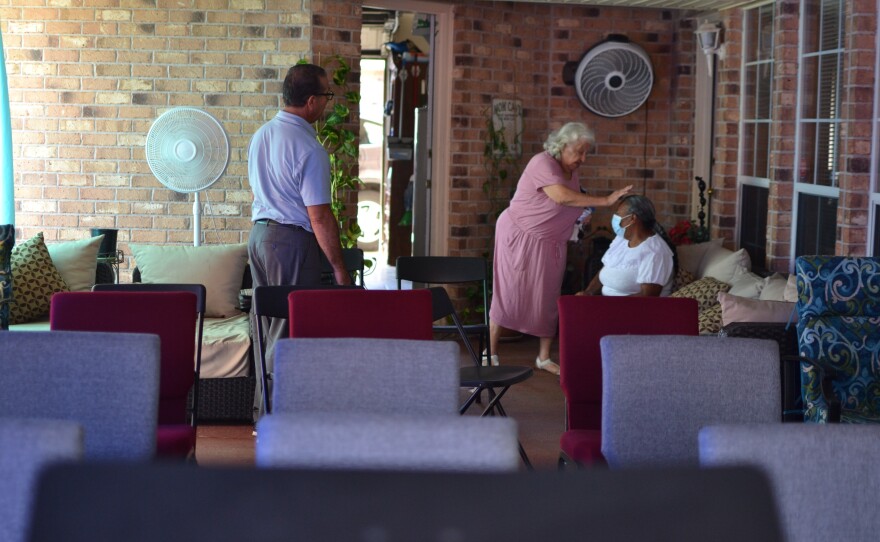Just a few blocks away from a stretch of busy highway in LaPlace, La. — about 30 miles northwest of New Orleans — Donald Caesar Jr., 49, walks down the street he grew up on and has lived his entire life. Even a month after Hurricane Ida pummeled Louisiana as a Category 4 storm, this street and many others in the hardest-hit areas of the state are still completely unrecognizable.
"It's just overbearing to some people who thought they could handle this. And they never seen this. It's never impacted like this," Caesar said. "We don't have nowhere to go, so we just have to deal with it, you know?"
Caesar has been spending most days and nights in his red pickup truck keeping watch over his 82-year-old uncle's house. The roof was ripped off, and it's now completely unlivable. Along the walls, black mold is growing; the floors are wet and dirty; flies circle around garbage.
It's hard for Caesar to see. This house has been in his family for generations. Caesar says his great-grandparents migrated from Africa in the early 1900s and were able to acquire land on this street. Since then, fathers, uncles, aunts and nephews have lived here.
Now, much of the family-owned property is destroyed. The tree his grandfather planted about a hundred years ago didn't survive Ida's wind either.
"It was always joyful to feel like a chimpanzee to try to climb it," Caesar said. "We used to run to try to climb it. This is where everybody came together ... the functions were in this yard."

Caesar says it's devastating to see so much destruction within this Black community in LaPlace — one that has weathered so many storms. And that's leading many residents in the city to consider moving away.
Two months after the hurricane, the water is back on. Grocery stores have reopened. Hundreds of thousands of cubic yards of debris have been picked up.
But unlike New Orleans, St. John the Baptist Parish, where LaPlace is located, is outside any federal levee protection system. And it faced severe damage from storm surge and powerful winds. Many homes will have to be gutted.
"A week ago my mom caught a heart attack. She said [it was] stress," Caesar said. "She shouldn't have been back there so long. She's asking herself right now: should she leave? Should she just call it quits?"
Laying down roots in LaPlace
St. John the Baptist Parish sits between New Orleans and Baton Rouge. People of color make up the majority of its population.
The region is home to numerous former plantations. Many Black families either have descended from formerly enslaved people or — like the Caesars — have otherwise been here for more than a century.
The region is now also home to many immigrant communities from places like Mexico, Puerto Rico and Colombia — many of whom came here to work in the area's numerous petrochemical plants. Like generational Black families, Latino families who have laid down roots here are also questioning whether to stay or leave.
One church just down the street from the Caesars — Iglesia Pentecostal Providencia Divina — has been a lifeline for these migrants since it formed about a decade ago.
Pastor Wanda Rivera and her husband, Pedro, came to the mainland U.S. from St. Croix in the U.S. Virgin Islands. Rivera says she began her ministry by passing out Christian tracts — pamphlets sharing her faith. Then the couple began holding bilingual services, forming a community of Spanish-speaking church members.
They soon found a permanent home on the edge of the same busy highway in LaPlace where the Caesars live. Now it lies in rubble.
Like many buildings here, the church was destroyed by Hurricane Ida, the entire back concrete-block wall ripped away by a big tree that was uprooted by the storm.
"It was everything for us," Rivera said.
But the community is still together. Pastor Wanda Rivera has moved the church — or at least its congregation — to the back porch of her home about a 15-minute drive away.
"We cleaned everything as much as we could. And we ... fill it up with chairs [so] that looks like a church. And we have, like, a music stand," Rivera said.

Rivera has tried to salvage what she can, storing odds and ends in a garage behind the kitchen. There's a drum set and speaker, empty aluminum casserole dishes for potlucks, even a giant prop in the shape of a Bible that her sister painted for an event at the church.
But with the loss of the church has come the loss of many services. Rivera says church members used the building to store clothing and food given to people in need.
In the aftermath of Hurricane Ida, Rivera says undocumented people in LaPlace are especially vulnerable. Legal status in the U.S. is necessary to apply for relief payments from the Federal Emergency Management Agency.
"When President Trump was talking about deporting people and the riots, we [invited] a lawyer," Rivera said. "More than 3,000 people in the church [attended] with that lawyer wanting to know their rights. And I didn't even know there were that many Hispanic [people] in the LaPlace."
Rivera says she's been trying to help those with limited English skills understand their rights and navigate the systems designed to help with storm recovery. Families with mixed immigration status can use, for example, a child's social security number, according to FEMA public affairs officer John Mills.
A community that must decide whether to stay together
Jaclyn Hotard, president of St. John the Baptist Parish, is worried people will leave.
"No matter where you go, there are things that can happen. Whether it's, you know, tornadoes and earthquakes and just all of these different, you know, acts of God," Hotard said. "And so where do you really go? And I think the real answer is building better."
Some residents, like the Caesars, say they feel like the response from local officials has been slow.
"I can assure you that we have been very responsive," Hotard said. "I couldn't get to my own house, you know, for about four or five days after the storm. We had about two feet of water in the house and my car flooded also. I can empathize with the residents and what they're going through."
Hotard noted that a local levee system got funding in 2018, and that it will be a game changer for the parish once it's constructed. But it is scheduled to be completed in 2024 — after several hurricane seasons have passed.
Other residents noted that LaPlace routinely floods — but also said the floods were becoming worse. Climate change is likely to make hurricanes intensify more rapidly, grow more powerful and drop more rain.
"When you look at ... some of the storms that are hitting, it's a serious situation," said Mills, the FEMA representative. He says when it comes to staying or leaving in a hurricane zone, "these are tough questions for communities to answer."
Thousands in the parish have asked for help from FEMA. But Mills said the agency cannot give money to people if they have home or flood insurance. Mills said FEMA was doing its best to help, but said its role was to offer a helping hand in a crisis — not to help people rebuild if they didn't have insurance.
"A lot of people are going to rely on the good work of charitable voluntary and faith-based organizations that are actively working in a lot of communities," Mills said.
Rivera's church is trying to fill some of those gaps. Her family is using their backyard to prepare food for distribution in the community. Rivera admits with so much loss, she sometimes imagines leaving LaPlace.
For the time being, Rivera and her congregation are staying. In fact, they're renting space from another local church.
"I was praying and I was like, you know, I don't have a reason to stay," Rivera said. "[But] I love these people. I love the ministry."
Much of Donald Caesar Jr.'s family has left LaPlace, including his 82-year-old uncle, who is staying in Baton Rouge. While his uncle would like to return, he cannot come back until his home can be fixed or he finds a new place to live. That could take months or even a year.
But Caesar says he can't imagine leaving. He'll continue walking up and down the street he grew up on, surveying his home and the stump of his family's hundred-year-old tree, waiting for help to arrive.
This is where he's been all his life and it's all he knows, he said. And he believes his family will come back too.
"They're resilient people. They're going to come back; they're going to rebuild," Caesar said. "The tree might not be. The house will be back."
Caesar said it's just a matter of when they can all start picking up the pieces.
This story was produced with reporters from the Gulf States Newsroom, a collaboration between WWNO in New Orleans, Mississippi Public Broadcasting, WBHM in Birmingham, Alabama and NPR. Support for health equity coverage comes from the Commonwealth Fund.
Copyright 2021 WWNO - New Orleans Public Radio. To see more, visit WWNO - New Orleans Public Radio. 9(MDAzMjM2NDYzMDEyMzc1Njk5NjAxNzY3OQ001))









